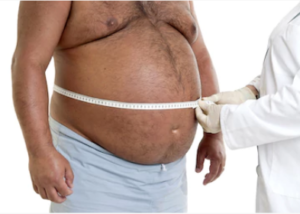
Being fat increases the risk of uterine cancer, plain and simple.
DNA mutations that lead to uterine cancer do NOT care if you love your larger-than-life body or hate it.
Fat is a risk factor for uterine cancer, and the only way around this is to lose weight. Learning to “love your skin” will not nullify this well-established risk factor.
Obesity or being “fat” and good health should never be in the same sentence, unless it’s to say that obesity and good health cannot co-exist in the same body.
So it’s no surprise that a fat body is a risk factor for uterine cancer.

ParentingPatch, CreativeCommons
“The adipose tissue or fat tissue in obese patients has an enzyme called aromatase that can convert other hormones in the body to a weak estrogen,” says Diane Yamada, MD, Chief, Gynecologic Oncology, University of Chicago Medical Center.
In essence, the patient is getting significantly more estrogen than the ovaries would normally produce.
This constant, higher level of estrogen is not counteracted by progesterone.
It may stimulate the lining of the uterine cavity (the endometrium) to develop precancerous change, and then cancer.”
In other words, the more lifetime exposure that a woman has to circulating estrogen, the higher her chances of developing the malignancy.
Of course, this risk is her baseline risk, and the baseline varies from one woman to the next.
Genetics may play a part, and genetics cannot be changed. However, obesity is primarily linked to lifestyle habits.
Uterine cancer is also known as endometrial cancer, and some risk factors are tied to the exposure to estrogen.
You now know how a lot of excess fat in the body influences the risk for uterine cancer. But here are other factors tied to estrogen:
Many years of menstruation (beginning before age 12, and/or late menopause).
The more monthly cycles a woman has, the more her uterus is exposed to estrogen.
Which is why never having been pregnant, and even having just one pregnancy, is another risk factor for this disease. However, researchers aren’t sure why this increases risk for the condition.
It may be because pregnancy increases levels of progesterone, which offset the effects of estrogen.
According to the American Cancer Society, obese women have triple the risk of uterine cancer, and overweight women have double the chance.
But if you’re medium weight or even skinny, don’t think this makes you immune to this disease! Thin women can get it, too.
A high fat diet is another risk factor for uterine cancer, not just because it promotes obesity, but because some fatty foods may influence estrogen metabolism.
Keep in mind that a non-overweight woman can still have a high fat diet.
The fats at issue here are the so-called “bad” fats: the saturated and trans (manmade) variety, found in animal products and processed foods (e.g., commercially baked goods), respectively.
Other risk factors for uterine cancer are estrogen-only hormone replacement therapy, tamoxifen for breast cancer, ovarian tumors and diabetes.
Non-obese women with diabetes actually have an increased risk of uterine cancer. The majority of cases occur in women over the age of 55.
It’s never too late to lose weight, and food intake has everthing to do with obesity.
 Dr. Yamada specializes in the diagnosis and treatment of gynecologic cancers including ovarian, uterine and cervical. She is also an editorial reviewer for numerous academic medical journals.
Dr. Yamada specializes in the diagnosis and treatment of gynecologic cancers including ovarian, uterine and cervical. She is also an editorial reviewer for numerous academic medical journals.
 Lorra Garrick has been covering medical, fitness and cybersecurity topics for many years, having written thousands of articles for print magazines and websites, including as a ghostwriter. She’s also a former ACE-certified personal trainer.
Lorra Garrick has been covering medical, fitness and cybersecurity topics for many years, having written thousands of articles for print magazines and websites, including as a ghostwriter. She’s also a former ACE-certified personal trainer.
.









































